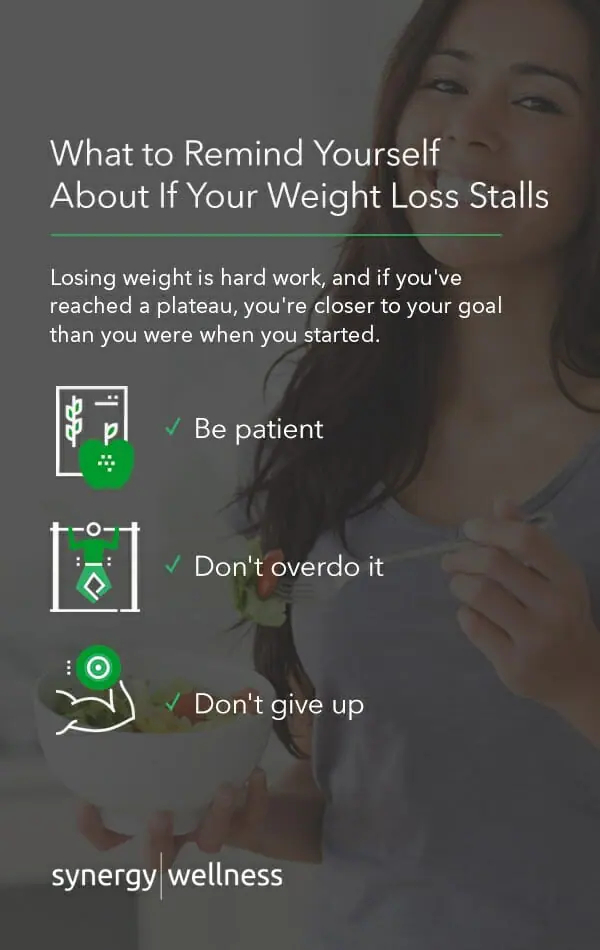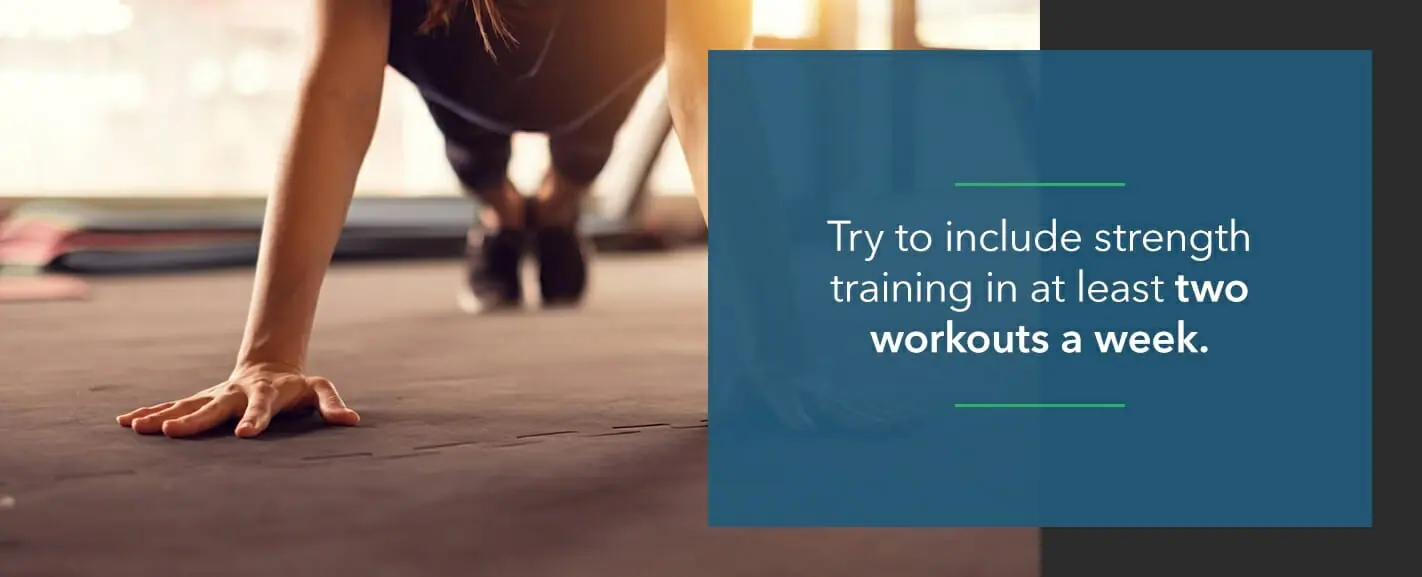You’ve been cutting down on sweets, filling up on veggies and walking on the treadmill five days a week. At first, your hard work paid off, and it felt incredible watching the number on the scale go down. But now, the scale won’t budge, and you feel stuck with 10 or 15 extra pounds. You’re standing on a weight loss plateau, wondering if you’ll ever reach your goals.
Weight loss plateaus can be frustrating, especially if you’re struggling to identify the cause. Still, try not to get discouraged. It’s normal to reach a plateau during a weight loss journey. The good news is that you don’t have to stay stuck, and you can continue to burn fat, no matter how challenging it seems.
What Is a Weight Loss Plateau?
A weight loss plateau occurs when one’s efforts to lose weight seem to slow or stop altogether. A plateau happens to everyone who tries to lose weight as their metabolism declines as their weight decreases. However, while this is common, it is still upsetting for many people, especially when their goal weight is within reach.
Why Can’t I Lose Anymore Weight?
Doctors aren’t entirely sure why weight loss plateaus happen to even the most disciplined individuals, but they have ideas of possible causes. Here are some reasons weight loss might stall.
1. You Shed Water Weight First
When you begin a weight loss plan, your body releases its store of glycogen for energy. Glycogen is a type of carbohydrate that’s partially made of water. As a result of this process, you lose “water weight” at first. Your body will then turn to fat and muscle for energy.
The water weight effect is only temporary. Eventually, you’ll renew your glycogen stores, and the water weight will return, which can look like a plateau. You’ll need to continue increasing your activity levels and decreasing your caloric intake to keep burning fat.
2. Your Metabolic Rate Decreases
Your metabolism naturally slows down as you lose weight because your muscle mass decreases. Muscle increases your metabolic rate and helps your body burn calories faster. When you no longer burn more calories than you eat, weight loss stalls.
Your metabolism may also adapt to a lower caloric intake and slow down to conserve energy.
3. Your Body Becomes More Efficient
As you lose weight, your body doesn’t have to work as hard to exercise and perform daily tasks, so it won’t burn as many calories. It’ll also help you perform your workout routine if you stick to the same movements and intensity levels over time. Overall, if you don’t continue to challenge your body, you could reach a weight loss plateau.
4. Your Body Needs Time to Reset
plateau may mean your body is adapting to a new set point. According to the set point theory, your body has a weight range at which it’s most comfortable. If you try to go below your set point, your body will fight to stay within its normal range by slowing your metabolism.
This doesn’t mean you can’t change your set point weight. If you think you’ve reached your set point, give yourself a month or two to maintain your weight and allow your metabolism to adapt before cutting calories and increasing your activity levels.
What to Remind Yourself About if Your Weight Loss Stalls

If you stop losing weight despite sticking to a diet and workout plan, first, don’t be too hard on yourself. Instead, take a moment to celebrate what you’ve accomplished so far. Losing weight is hard work, and if you’ve reached a plateau, you’re closer to your goal than you were when you started.
Also, keep the following tips in mind:
- Be patient: Hitting a plateau can feel discouraging, but it’s important to be patient. Weight loss is a lifestyle change that takes time to reach your goals. If you’re feeling stressed, allow a few weeks to maintain your current weight and adjust to a new plan. Once you’re ready, you can focus on reaching your ideal weight again.
- Don’t overdo it: If you feel tempted to fast, over-exercise or take extreme measures to break through your plateau, resist the urge. Cutting your calories too much will slow your metabolism, and you could miss out on critical nutrients. Over-exerting yourself can also be harmful and lead to an injury.
- Don’t give up: A weight loss plateau is a sign that you were doing something right, and now you need to switch things up. With a new plan, realistic expectations, and a positive mindset, you can overcome the plateau.
8 Tips to Break a Weight Loss Plateau
Often, reaching a plateau means you need to make changes to your exercise routine or diet. If you regularly challenge your body and practice patience, you can drop more pounds and reach your ideal weight. Here are some tips to help you break your plateau for greater results.
1. Change Your Fitness Routine
If you do the same workout for months, your body will get used to your routine and become more efficient at completing the activity. You won’t burn as many calories if your body doesn’t work as hard to move a certain way.
Performing the same workout all the time will make it easy for your body to get used to that specific exercise, which will cause it not to work as hard. You can try increasing intensity or doing new exercises to confuse your body and cause a greater burn.
For example, if you enjoy walking, you can turn it into a fun game with some intervals of a faster pace or walking at a steeper incline. You do not have to change your workout a lot to get a great burn. For example, you could start with each interval lasting only a minute and then slowly push yourself to increase each interval’s time.
Changing your exercise routine can also keep you from feeling bored and inspire you to reach your goals. It’s best to incorporate activities you think you’ll enjoy or have always wanted to try. For instance, instead of hopping on the treadmill again, you might walk around town. Or maybe you’ve always wanted to take a Zumba class. If you can add fun to your workouts, you’ll likely feel more motivated to stick to them.
No matter how you decide to challenge yourself, set realistic expectations and give yourself time to rest. Generally, try to exercise for 30 minutes on most days of the week. As you get better at a new workout routine, gradually increase duration and intensity or try something completely new — whatever it takes to keep your body guessing.
2. Build Muscle With Strength Training
Another way to help you overcome your weight loss plateau is to incorporate strength training into your routine and build muscle. Muscle tissue burns more calories than fat, even when you’re resting.
Try to include strength training in at least two workouts a week. You might do push-ups, lift weights or use resistance bands, for example. Do each exercise until it’s difficult to do another repetition. Make sure you don’t exercise the same muscles two days in a row, though, to give them a chance to recover.
3. Track Your Caloric Intake
If your weight loss has stalled, you may need to reassess your eating habits. It’s easy for calories to sneak into your diet and add up fast. Many people underestimate how much they’re eating, but there’s a solution. You can better understand your portion sizes and caloric intake by keeping a food journal or using a calorie tracking application.
You’ll want to record everything you eat and drink throughout the day. If you keep a food journal, consider also noting the time of day and how you feel when you eat. This may be especially helpful if you tend to snack when you’re stressed, bored or experiencing other emotions that lead to overeating.
As you use your journal or tracking app, you can track patterns to help you find healthier ways to curb cravings or deal with emotions. While you will want to reduce the amount of calories you eat per day, you will want to make sure you do not go below 1,200 calories a day.
 4. Eat More Protein
4. Eat More Protein
According to a study published by the Journal of Obesity & Metabolic Syndrome, high-protein diets successfully induce weight loss. There are several reasons for this. First, your body burns more calories digesting protein than breaking down carbohydrates or fats.
Secondly, protein can help increase the production of hormones that help you feel full. Lastly, protein can help guard against muscle loss, reviving your metabolism.
Even though protein can aid weight loss, it doesn’t mean you must eat meals with high amounts of meat and protein. Only increase your intake if needed. If you are minimally active, you will need to consume at least 0.8 grams of protein per kilogram of body weight per day. So, if you weigh 170 pounds or 77 kilograms, you need a minimum of 62 grams of protein daily. However, if you are more active, you’ll need a higher amount of protein.
5. Consult With a Registered Dietician
If you’re struggling to stick with a routine for your weight loss, it may be beneficial to speak with a registered dietician. You and your dietician can work together to make a plan personalized to your body, nutritional needs and goals. They’ll also help you identify and address any negative eating habits that you may not be aware of so you can make effective changes that you’ll use throughout your life.
Sometimes, medical conditions can make it difficult to lose weight. If you cannot overcome your weight loss plateau after making diet and exercise changes, consider talking to a primary care physician. A doctor can rule out conditions such as hypothyroidism or polycystic ovarian syndrome, which may make it more challenging to lose weight.
6. Get Enough Rest
Sleep plays a major role in helping you lose weight, whether you have just started or have been on your weight loss journey for a long time. People who do not get the recommended seven to nine hours of sleep per night may eat more calories during the day to cope with tiredness. Lack of sleep can also lead to increased stress and unhealthy food choices.
If you’re struggling to get the sleep you need, consider taking a break from your workouts and giving your body time to recover. Try different techniques to help you sleep better and longer, such as limiting screen time before bed. Make sleep a priority, and you can get back on track when you’re ready.
7. Reduce Stress
For many people, stress triggers the desire to reach for high-calorie comfort foods like cookies, chips and chocolate. If this sounds like you, you’re not alone.
It’s essential to reduce your stress levels to progress toward your weight loss journey. For instance, stress causes your body to increase production of cortisol, leading to a greater appetite. Foods high in sugar and fat also seem to counteract stress, which may be why people often crave comfort foods when they feel tense.
To help you manage stress and resist junk food, consider having some relaxing activities you can enjoy instead of eating, such as meditating or practicing deep breathing techniques. It may also be helpful to talk about your feelings and what may be causing stress to a therapist.
8. Look for Other Ways to Measure Success
While the scale may play a major role in your weight loss journey, it’s not the only tool you have available to measure success. Other factors, such as body measurements, increased energy and improved fitness levels, also demonstrate success. You may be building muscle but losing fat while keeping a stable weight. So, instead of looking at the number on the scale, you can measure success by clothing that fits more comfortably or by feeling more positively about yourself.
Our Team of Licensed Medical Professionals Can Help
At Synergy Wellness, we understand that each person’s weight loss journey is deeply personal, which is why we offer customized treatment plans for all of our patients. Our experienced team consists of licensed medical doctors, physician assistants, family nurse practitioners and registered nurses, making us a qualified and knowledgeable choice for care.
We will be by your side throughout your weight loss journey with many check-ins and adjustments to ensure you continue meeting your goals while looking and feeling your best. To learn more about how we’ve helped many of our patients, we invite you to consider our testimonials for authentic accounts of the benefits of our services from our patients.
What to Do If You Still Can’t Lose Weight
If you continue to feel stuck on a weight loss plateau and could use a motivation boost, we’re here for you at Synergy Wellness. We understand that losing weight can be challenging and that everyone has different needs and goals. At our weight loss clinics in Fresno and Bakersfield, California, we’ll consider your goals, body composition and budget to create a safe and effective individualized weight loss plan.
If you’re ready to break through your weight loss plateau and make lifestyle changes that count, contact us today to schedule a consultation.








